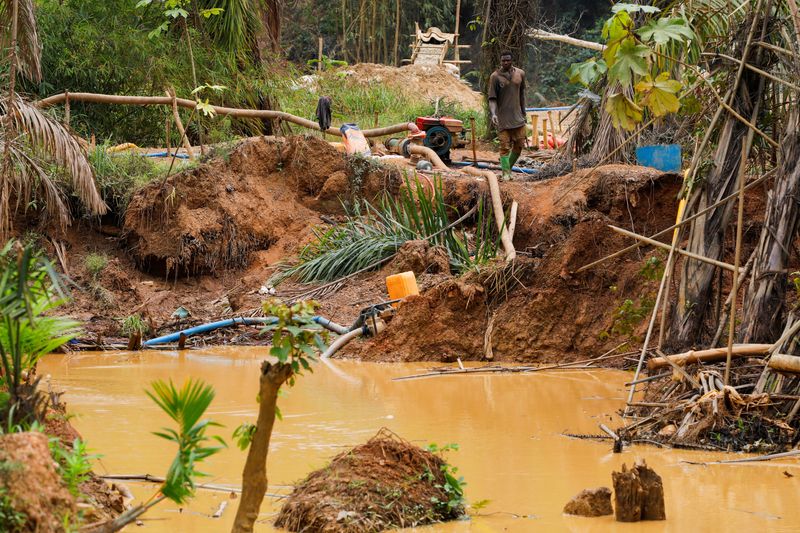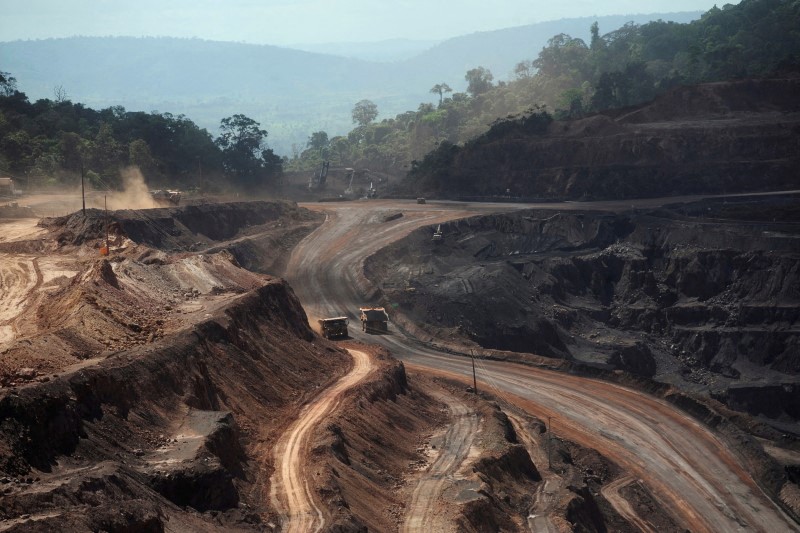By Maxwell Akalaare Adombila
PRESTEA-HUNI VALLEY, Ghana (Reuters) – At an unlicensed gold mine in Ghana, men in T-shirts, shorts and rubber boots wade through puddles of muddy water laced with mercury, pull out rocks with their bare hands and operate a rickety lock while they search for the precious ore.
The dilapidated mine is part of a booming business that generates livelihoods and informal income streams for the Ghanaian economy, even as it damages the health of miners, pollutes waterways, destroys forests and cocoa plantations and fuels crime.
“It’s risky, but I just want to survive,” said one of the men at the feral cat site visited by Reuters in the Prestea-Huni Valley district of western Ghana.
The 24-year-old accounting student, who asked not to be named because he was involved in illegal activities, said he skipped classes to pan for gold because he needed the money after losing his father as a teenager.
There was no professional protective equipment in the mine. Men carried thin plastic shopping bags on their heads. One had swimming goggles and the other had a rice bag covering his torso.
The unlicensed gold mining industry, known in Ghana as ‘galamsey’, has grown at a breakneck pace this year, while the global gold price has risen by almost 30%, attracting new entrants.
Small-scale mines produced 1.2 million ounces of gold in the first seven months of this year, more than in all of 2023, according to data from Ghana’s mining regulator.
About 40% of Ghana’s total gold production comes from small mines, as opposed to concessions operated by multinational companies. About 70-80% of small mines are unlicensed.
Poisoned profits
Martin Ayisi, head of Ghana’s Minerals Commission, the mining industry regulator, said most galamsey gold was smuggled out of the country and therefore did not contribute to national gold export revenues.
For Ayisi, the rise in gold prices is good for Ghana as it helps the country recover from a severe economic crisis in 2022 that required a $3 billion IMF bailout.
“We should be able to get a lot of money and probably get out of the IMF program sooner,” he said, predicting that national gold export revenues would more than double this year to $10 billion.
But industry experts say the lines between legal mining and galamsey are blurred, and gold from informal mines represents a larger share of revenues than authorities acknowledge.
However, the dangers of galamsey are not in dispute.
According to news reports and human rights groups, dozens of miners have died in collapsing mines in recent years, while hospitals and health centers report large numbers of premature deaths from lung diseases among miners and residents of towns and villages near mines.
These are caused by inhaling dust containing heavy metals such as lead, as well as toxic fumes from the mercury and nitric acid that the miners use to leach gold from the sediment.
The chemicals are then dumped on the ground or in rivers. Ghana’s water authority says mercury and heavy metals from mining have contaminated about 65% of water sources.
Meanwhile, thousands of hectares of cocoa plantations and virgin forest have been destroyed by illegal miners, according to data from Global Forest Watch, an online monitoring platform.
Protesters have taken to the streets of Accra in recent weeks to criticize President Nana Akufo-Addo’s government for its failure to address these issues. “Leaders, you have failed us!” read some placards.
“Galamsey must stop. We want to live long. We don’t want to get sick. We don’t want to go to the hospital,” said Aboubacar Sadekh, who took part in a march on September 22, draped in a Ghanaian flag.
The government denies failing to take action on galamsey. When he came to power in 2017, Akufo-Addo promised to take action on the issue, and during his time in office the government has launched a crackdown, deploying soldiers to arrest illegal miners. In some cases, mining equipment was seized and destroyed.
ORGANIZED CRIME
Opinion polls show Galamsey is one of the top five issues for voters ahead of the December 7 general election.
The leading candidates to replace the outgoing Akufo-Addo as president, Vice President Mahamudu Bawumia and former President John Mahama, have pledged to formalize the galamsey, for example by funding a state agency to prospect for gold and map areas where the locals can mine.
But successive governments have promised for years to tackle the problem without making much progress, partly because powerful people profit from the industry, experts say.
Chris Aston, head of a British-backed program aimed at regulating small-scale gold mining in Ghana, said artisanal miners are vulnerable to organized crime gangs, who provide them with upfront financing for equipment, unlike other lenders.
“Pre-financing of miners is a way for organized crime groups to enter the gold supply chain,” he said. Financiers then “require miners to sell the gold they extract back to them at a subsidized rate.”
Emmanuel Kwesi Anning, a security consultant based in Accra, said galamsey fueled an increase in arms trafficking as those overseeing illegal mines sought armed protection from rivals or thieves.
He also said that politicians and traditional rulers in some areas have cut their galamsey profits, further entrenching the problem.
“It has become an elite consensus that they will not touch this matter.”

Ghana’s information minister did not respond to requests for comment on allegations of organized crime involvement, arms smuggling and corruption.
A top official at the Ministry of National Security, who asked not to be named because they were not authorized to speak publicly on the matter, said authorities were working to investigate links between illegal mining, money laundering and arms trafficking. to tackle.


